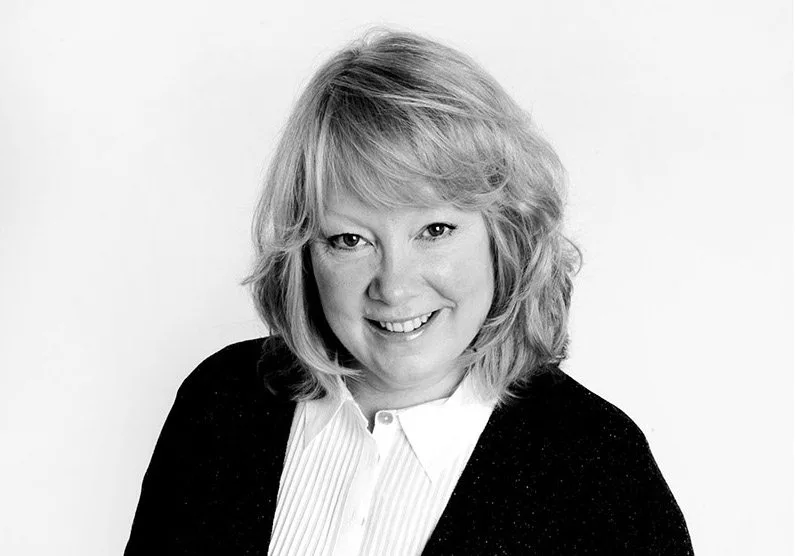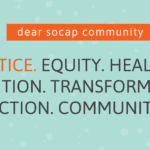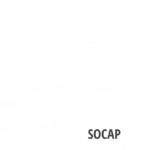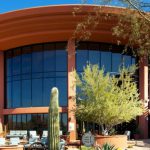If you’ve heard of Sustainable Brands, odds are you primarily think of it as a conference. And indeed, the organization’s annual gatherings draw thousands of business executives and their teams from around the world to discuss the future of business that supports life for the long term. But the conference is just one part of what the parent company, Sustainable Life Media, does — including editorial content, education, webinars, membership, and more. “We see ourselves as a change agency,” says CEO and founder KoAnn Vikoren Skrzyniarz. “The conferences are a way for us to drive change.”
Skrzyniarz founded the company in 2006 after a successful career in media, including helping grow a trade publisher from $80 million to $1 billion in revenue. After stepping away from that role, some trends she’d been noticing around connecting purpose to profitability, plus ways of thinking about systems change and environmental sustainability, began to coalesce for her. “I recognized that we were right in time for a major pivot in the way our economic systems worked,” she says. “The prevailing paradigm held that the only salvation for our future was NGOs and governments. I believed otherwise. There was a missed opportunity positioning business as a hero for our future.”
Since launch, Skrzyniarz and Sustainable Brands’ focus has been on influencing primarily large global brands, as they have the capacity to create change at scale. Part of the sell is that sustainability and social issues can be core drivers of innovation and brand value.
We spoke with Skrzyniarz to get her take on what being a sustainable brand really means, who’s doing the best job of it, and the role of consciousness and even spirituality in leadership in this space.

Sustainable Brands’ 2016 Conference
What companies would you say are the role models or leaders in this space?
KoAnn Vikoren Skrzyniarz: Unilever gets a lot of visibility in the press for their long commitment and steady, unshaken, vocal leadership around embedding sustainability into the core of their business. There are many more coming along: Danone, Nestle… Pepsi has been working on embedding their ‘Performance with Purpose’ platform for a decade.
Many companies are working on this. Certainly all of our members are. They’re working at it and developing leadership in different ways, but, if we have anything to do with it, they’re all eventually looking to embed sustainable thinking and social purpose into the core of their business strategy.
How do you determine who’s for real, who’s really doing the hard work to embody this “social and environmental good” mindset? As opposed to companies that are maybe just doing a good job in their CSR and their philanthropy programs?
KS: First of all, we don’t have any real focus on philanthropy because we think that’s outmoded. We’re 100 percent focused on embedding environmental and social good into the core of business strategy and brand strategy. Certainly all these companies still have philanthropic arms — you can’t change the paradigm that’s embedded in organizational structures and thinking and even the law overnight — but we don’t typically engage with them.
The way we think about it, a company is a community of hundreds, sometimes thousands of people and we are interested in enabling changemakers inside those companies. We acknowledge that no one person in the company, even the CEO, reflects its full intentions. Certainly the CEO is where the buck stops, but we know there are a lot of entrepreneurial change agents who are as passionate about driving change within their organization as we are. Those people need to be served and enabled with business logic, arguments, data, case studies, and other things that can help them march the agenda up the ladder. The biggest change we can create is by enabling those people in the organization who are at a level of significant influence, who are engaged with the C-Suite. The CEO may say, “We want to become a more sustainable company” or whatever, but somebody’s got to make that happen for real. We primarily target and work with the people figuring out how to actually take action on what may be a fairly broad or nonspecific agenda.
In terms of our membership, we have membership guidelines and principles. Right now the basic principle we require is that companies show up. They can’t just buy a logo on our membership list. They have to be participating. They have to have done some kind assessment of the impact their company has on their customers and the communities they work in and other stakeholders, including their suppliers. They have to have some goals established to be working towards mitigating those material issues, and they have to be showing some demonstrated progress over time.
What kind of wake-up call would you want to deliver to companies who might be interested but not involved yet; the ones on the sidelines?
KS: The world is becoming more conscious. Operating from a place of unconsciousness is not going to survive going forward.
How do you talk about your own level of consciousness?
KS: I grew up in a conservative evangelical Christian home and spent a lot of time early in my life trying to understand specifically who Jesus was and what he was all about.
I have since migrated my worldview to reflect an understanding that none of us has a complete understanding of truth and meaning at the existential level. We all have our own piece of the puzzle and there is so much alignment of wisdom across all the faith-based traditions in the world. One of the things that drives me personally is the desire to make connections between people who tend to want to put themselves in a box and put others in another different box, understand that there’s more that connects us than divides us. It’s a deep personal passion and probably my purpose. It breaks my heart what is going on in the world right now with the increasing polarity between faith, religion, political parties, or what have you.
One of the things I’m very proud of is that our community is full of Republicans and Democrats; we intentionally have Buddhist monks, pastors, and Muslim faith-based representatives regularly in our conversations. We try very hard to grow the circle without breaking it by choosing to frame the conversation respectfully. We can connect across all sectors. It’s super important to me.
What is your opinion on the importance of community and belonging in greater society, and then of course within our own business community?
KS: The search for connectedness and meaning is core to who we are as humans. In the past several decades, there’s been a move away from religious institutions as a source for that kind of connection to the sacred, if you will. That has created a gap and a hunger that people are trying to look to solve in different ways. This whole conscious company movement and the move to align our work more with things that are important to us and to connect with each other on a deeper basis is a fundamental reflection of our moment in history.
How does spirituality play a role in your business day-to-day?
KS: It’s fundamental to who I am in general. This has been an interesting path to unpack because it’s a minefield for a lot of people. My organization itself is intentionally very diverse. I have people who span countries of origin, gender, identity, and many other things, and different faiths from atheist to Muslim practitioners to Christians to Jews.
My way of being in the world is all about trying to create a space that allows everybody to feel comfortable and safe. That takes time and trust, and that takes choosing languages and frames for discussion that are as free from being loaded with connotation as possible.
I find that once people begin to trust you as an authentic individual who respects perspectives that are different from your own or their own, they begin to feel more comfortable with being themselves. I think that’s what’s happened not only in our company but also in the community we serve. We would have characterized our intention to introduce this notion of “personal consciousness” as a Trojan horse in our efforts for the first probably six years of the decade we’ve been at this. But after six years and building a community where we modeled the behavior we wanted to elicit from others, in terms of people being willing, able, and expected to show up authentically and transparently and respectfully, then that has opened the door for us to open conversations.
To give an example, we recently screened the document “I Am.” It’s a film by Tom Shadyac, the Hollywood producer of all the “Bruce Almighty” movies. He had a personal transformation spurred by a physical injury which led to chronic pain which led to an existential crisis which led him to do this documentary. He inquired of people of many specialties — science, faith, biology, economics — about the meaning of life and how to fix things. The film challenges a lot of assumptions, including things like “growth is a natural requirement of our economy.” It shows many other personal, philosophic questions and conversations.
We chose to open that conversation in a room full of people who had come with the mindset of growth as a primary requirement of their work. It allowed a lot of them to enter into a new conversation, one they had been at some level unconsciously aware of: the conflict between what they might intuitively have sensed is not logical and what they are pursuing every day.
Talk to me about what matters most to you right now. What’s important to you in your life, in your business? Why?
KS: What I’m worried about now is there’s a lot of fragmentation going on. There’s an explosion of interest in sustainability, both on the brand side and also the number of entities and organizations that are trying to serve that movement. What I’m continuing to ask myself is, “How can we as an organization help continue to create and maintain as much alignment as possible in the insights, knowledge, and learning happening around the world every day so that we can accelerate rather than fragment the effort?” It’s a challenge from a business standpoint, too.
Just for the record, this movement isn’t just some big fad, right?
KS: This is not a fad.
A lot of our readers are what we call “conscious curious.” What’s your advice when they ask, “How do I become more sustainable? What are the starting points?”
KS: It starts with really understanding where your material impacts are on your customers, your suppliers, your community.
So if you’re not a products company, would you not have an easy place to start?
KS: It doesn’t matter what kind of company you have. If you’re a service company, your impacts are different than if you’re a manufacturing company. It may be more about education and awareness and engagement than it is on the materials you choose or where you manufacture or how you navigate your supply chain. But everybody’s got procurement activities and everybody has the influence over the dollars they spend. We are very active in leading the green meetings industry with our activities, for example.
How do you start to understand your impact? Is there something to go do? Is there a spreadsheet to fill out?
KS: There are so many. The B Lab organization offers a great framework for thinking about impact, particularly for smaller businesses. It goes to such a deeper level of complexity depending on the size of the business and the sector that a business is operating in. Obviously we consider ourselves as an enormous resource for all kinds of tools and solutions and case studies from companies who are working on this problem.
What’s your favorite leadership advice?
KS: There’s so many of us who are really starting to swear by the discipline of meditation. I practice yoga. There are lots of paths to becoming centered and conscious, but leadership begins to be around demonstrating that discipline. Particularly now where there’s just so much information being shot at us all the time and there is such a deep hunger for getting back to center, having a practice of some sort is really, really fundamental.
What’s next for Sustainable Brands?
KS: There is a growing recognition around the world that the consumer-based American Dream of the ’50s is not reflective of the good life, actually. And there is no real alternative vision to that yet. So we’re setting out on a big ambitious mission to change that.
We’re launching a three-year initiative focusing around a collective effort to redefine “the good life,” and then to design and deliver the good life we have redefined. The time is right and it’s a huge opportunity.
We’re going to be facilitating conversations and innovation-led formats that center around this question of “how do we connect more with what we personally, individually as humans hold sacred?” Identifying the gaps between that and what the market sectors we’re supporting currently hold as sacred cows. Then asking how we can collapse those things to be more aligned.
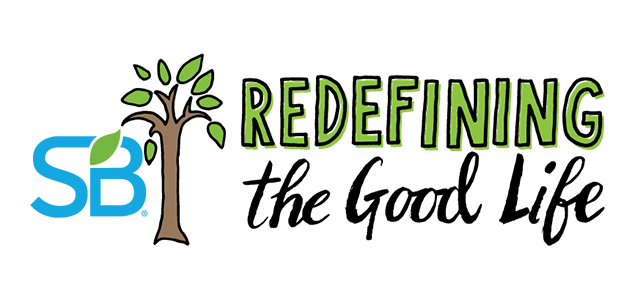
What’s giving you hope?
KS: Our community. Every time I’m out and experiencing the passion, commitment, hard work, willingness to tackle difficult problems, and the collaboration that’s unfolding around the world, it keeps me hopeful.
It’s very easy to get discouraged by what’s happening here in the US and in many other parts of the world, but I see that as reflective of an inevitable response to a collapse of the old. I think we’re at a pivot point in history where we’re either going to revert to the Dark Ages or we’re going to move on to the next Renaissance. I’m very committed to the latter and I know a lot of people who are.
